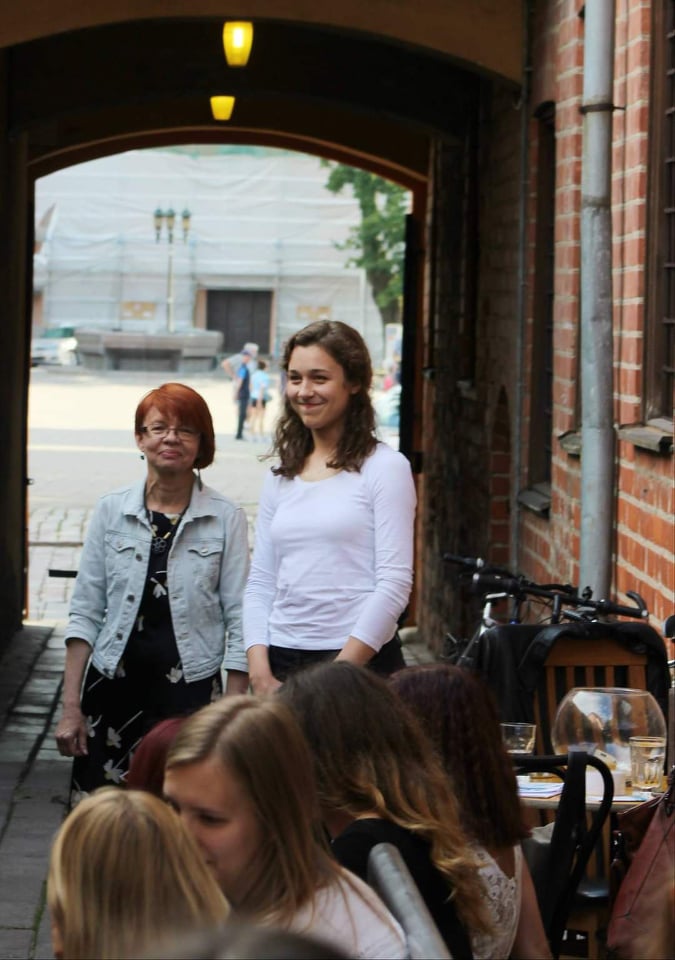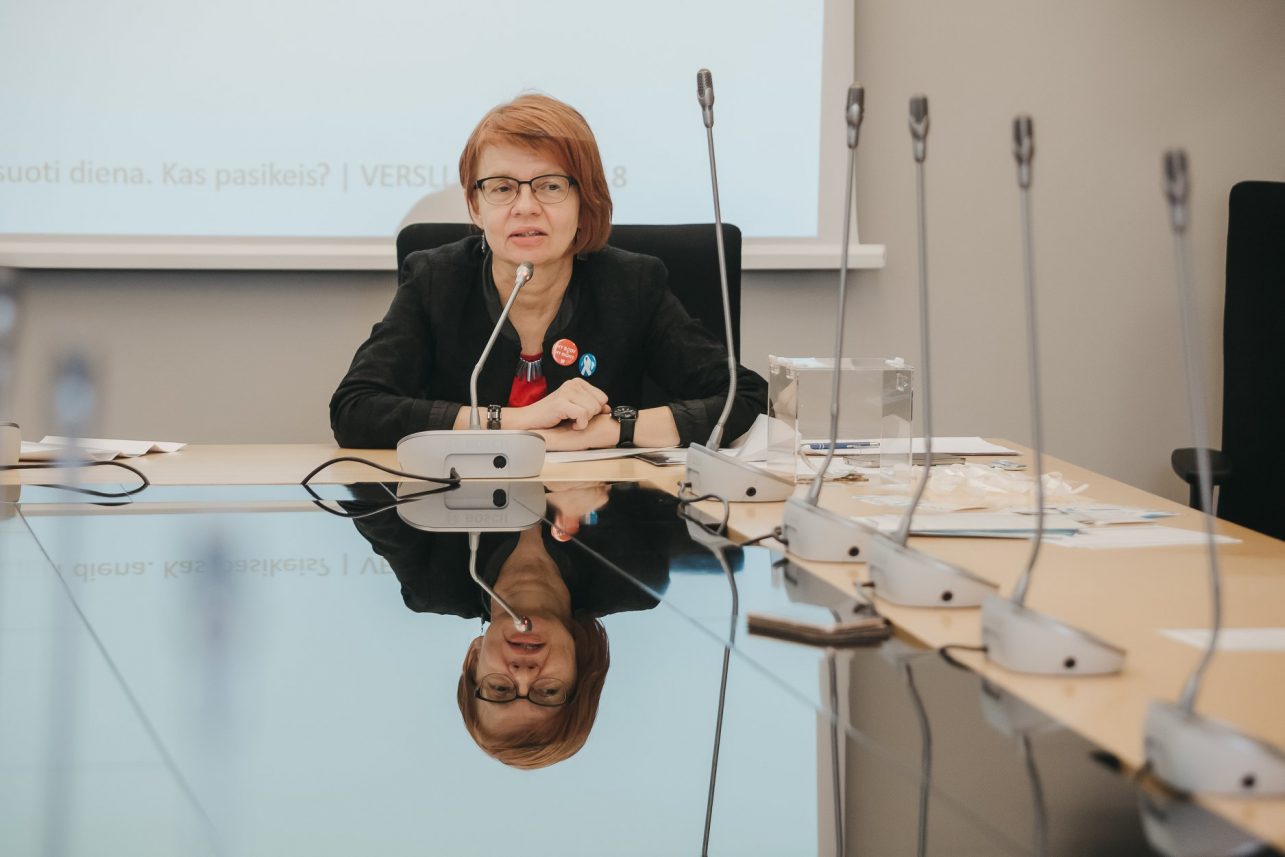Events marked with a white ribbon, symbolizing disapproval of violence, take place across the world annually at the end of the fall and beginning of winter and always last for 16 days.

“When we started organizing these events, we received questions, “So does that mean you can’t beat women only for 16 days?” Daiva Baranauskė ironically says. She is the head of Frida charity and support foundation, and she started the White Ribbon Festival tradition in Lithuania together with her team in 2015. She emphasizes that this period should draw more of the public and government’s attention. It would be impossible to work at this pace all year round and yet, Daiva works hard in this field every day. She says she would like to dedicate more time to implementing prevention rather than dealing with the consequences, but, like many NGOs, Frida – run by Daiva – is simply doing the government’s work.
Why November, December? Maybe spring would be more suitable, because events could take place outdoors as well. It was the United Nations that declared November 25 as the International Day for the Elimination of Violence Against Women and December 10 the Human Rights Day. Interestingly, the first events marked with a white ribbon in the US and Canada were organized by men – those who have realized that this activism is in no way directed against their rights.
“In Lithuania, if women do nothing, men just lie on the couch,” the interviewee aptly jokes. In an advertising campaign of 2017, famous men were photographed with symbolic white ribbons. Unfortunately, some of the campaign participants later revealed their true colors… For example, they publicly opposed the Istanbul Convention or were suspected of violence against their partner. “Either people are changing for the worse or they attend various protests without thinking, unable to see their real meaning,” Daiva thinks.
White Ribbon Festival is not only lectures or presentations but also cultural events. From exhibitions to contemporary dance, cinema, performances. “One of the reasons to follow this path is the sad fact that violence is a cultural norm. After all, the saying, “If he beats you, it means he loves you” is true. Passion and pain are closely related because platonic love usually settles over time, when the couple stays together for some time. If it happens from the very beginning, then only between very aware and intelligent people,” the activist says. She adds that men don’t beat women they don’t care about. They beat their wives, partners, sisters, mothers, or daughters. Of course, men suffer too. However, according to statistics, in Lithuania men experience violence in the domestic setting from other men. Violence inflicted by women is mostly due to defense.
“For example, in prison in Panevėžys, most women who have experienced long-term violence are serving time for very serious crimes. At some point their patience ran out and they experienced PTSD. The court does not see that. This diagnosis is not considered an exception like it is in the US, for example, where it is considered grounds for acquittal,” Daiva chooses facts instead of emotions. Interestingly, this legal situation was reached in the US with the help of Vietnam War veterans. Most of them, just like the victims of human trafficking, political prisoners, and victims of domestic violence, suffer from PTSD.
It is sad to realize that that “cultural norm” can be observed in action very early – in the fifth or sixth grade, when kids start showing affection to each other. Unfortunately, not always tactfully. You might remember the boys lifting up girls’ skirts in spring. When you complain to the teachers or parents, they tell you to be glad because it means they like you, “That is how pain and humiliation are coupled with love and affection in child’s mind.” It is difficult to untangle this connection later on. So, it would be better to teach children how to behave rather than program them in a wrong way. Maybe then there wouldn’t be tens of thousands of domestic violence cases.
Another and also very logical reason is to communicate through art and culture. It makes it easier to interest visitors, evoke empathy, provoke a discussion, invite them to open up and provide information without moralizing. “Bleak educational events are of interest to specialists and those who have a personal interest. I think that if we chose this path, we would dry up and stop evolving,” Daiva is convinced. She says that it will take her many years – the implementation of prevention takes a long time, especially without support from the state. And the program, which is characterized by different genres and locations, is formed in very different ways. It has to do with a personal taste, discoveries that have taken place in Kaunas or elsewhere during the year, and a circle of acquaintances. “It helps to broadcast a similar message in a different form every time, because the topic also differs annually.”
human rights were always around, I always wanted to help those who were in need.
Not all the events from the initiative address violence directly. “We talk about its causes: gender inequality, stereotypes, objectification of women, human trafficking.” For example, did you know that the number of cases of victim blaming is three times higher than the EU average? You’ve certainly heard things like, “You should not have drunk and danced provocatively,” “Why was she alone in a bus stop in the morning?” And so on.
There are many problems. Lithuania lacks specialists, laws, help centers (currently women without children are not admitted to the family crisis center!) free good quality legal help (Istanbul convention would make it mandatory) and a generally integrated system. Therefore, political views, when looking for partners and implementing ideas to strengthen prevention, are not important. We talk to those in power who genuinely care. After all, governments change, pandemics and other crises emerge and this issue, which is so prevalent as well, always remains in the background.
“If we will not invest in the future, in educating the younger generation, reducing stereotypes, new generations of perpetrators will grow,” Daiva says. Of course, she does not deny that the situation is improving. She meets many thirty-year-old and younger people and notices that the attitude is changing. “But perhaps it’s just my bubble. A survey of students shows that stereotypes, even among girls, have not disappeared because they are just eager, under public pressure, to have that better half.”

I couldn’t help but ask how Daiva started working in this field. it is quite unexpected and ironic. Growing up in Skaudvilė and later having to choose what to study, she chose… chemistry and biology. “I didn’t know myself well yet, I thought that working in the laboratory was the most interesting thing. I never worked in it because the governments changed. Also, I didn’t fit in at school, but I discovered the need to work with people and their problems. So, I got a master’s degree in social work, and human rights were always around, I always wanted to help those who were in need.” Daiva also told us she met a volunteer fighting against domestic violence, who had painful experiences. This is how the engine – which will require fuel for years to come – was started. As long as there are people like Daiva, it will continue to work. A little faster each year. One success story more, one tragedy less.

